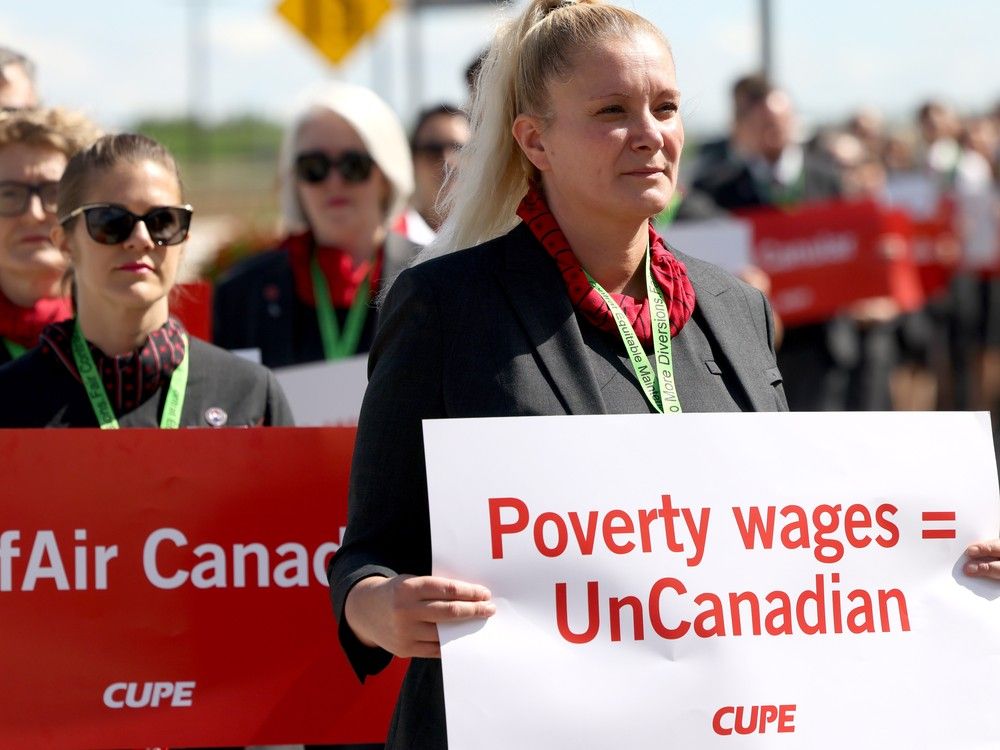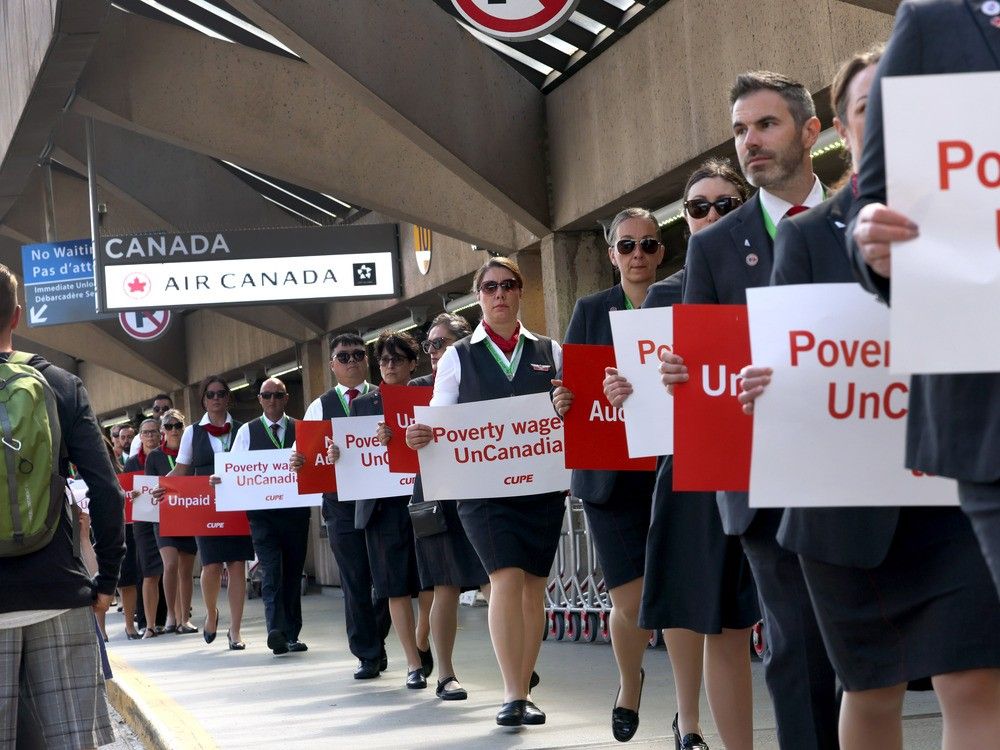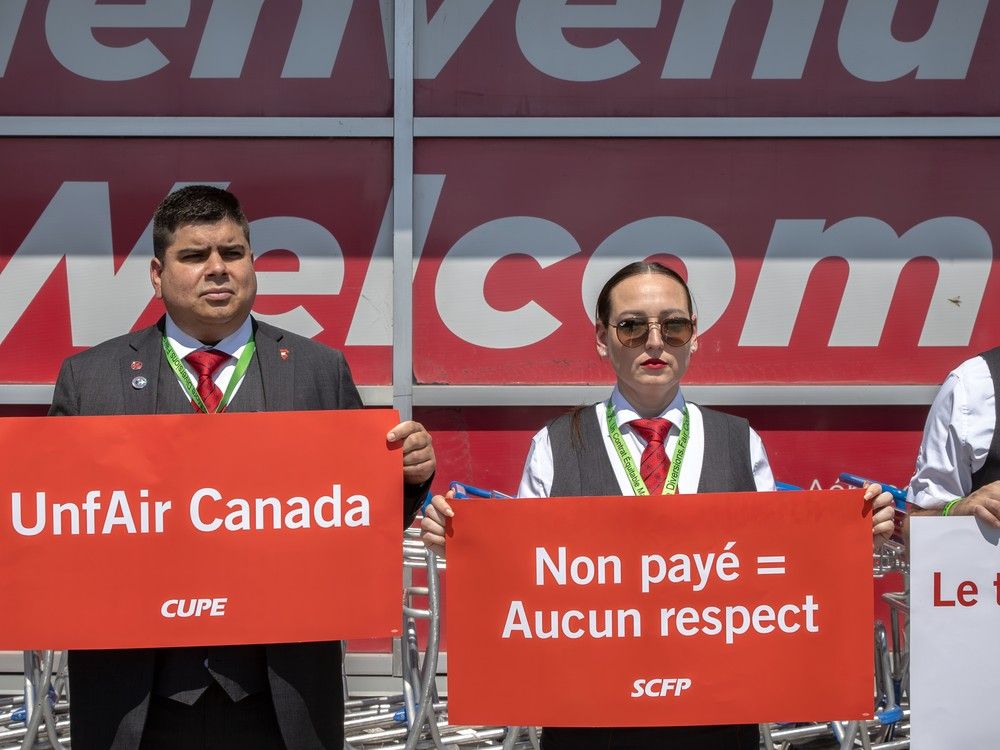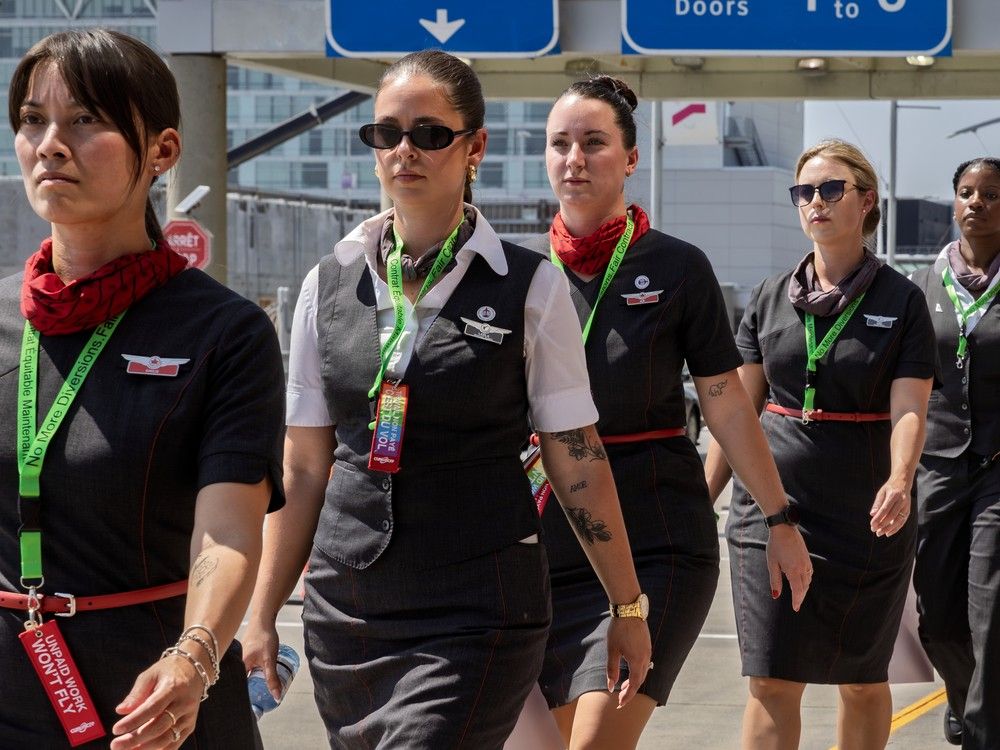
The union representing Air Canada’s flight attendants gave notice of a strike early Wednesday, leaving the plans of many travellers up in the air. A strike could occur on Saturday.
The airline then issued lockout notice, which it said in a news release was to “mitigate the strike’s customer impact” and “allow orderly shutdown.” Air Canada and Air Canada Rouge flights are being “gradually suspended over the next 72 hours.”
The Air Canada Component of the Canadian Union of Public Employees (CUPE) represents 10,000 flight attendants. Its president, Wesley Lesosky, said in a news release that it has put forward “solid, data-driven proposals on wages and unpaid work, all rooted in fairness and industry standards.”
“Air Canada’s response to our proposals makes one thing clear: they are not interested in resolving these critical issues,” he said.
President and chief executive of Air Canada Michael Rousseau said the airline regrets the impact a disruption will have on customers, stakeholders and communities it serves.
“However, the disappointing conduct of CUPE’s negotiators and the union’s stated intention to launch a strike puts us in a position where our only responsible course of action is to provide certainty by implementing an orderly suspension of Air Canada’s and Air Canada Rouge’s operations through a lockout,” said Rousseau.
“As we have seen elsewhere in our industry with other labour disruptions, unplanned or uncontrolled shutdowns, such as we are now at risk of through a strike, can create chaos for travellers that is far, far worse.”

Is your Air Canada flight impacted?
Customers should check to see if their flights are confirmed before going to the airport, the airline says. If a flight is not confirmed, travellers should not go to the airport.
“The first flights will be cancelled August 14, with more on August 15, with a complete cessation of flying by Air Canada and Air Canada Rouge on August 16,” according to an Air Canada news release.
Air Canada Express flights, the airlines’ regional flights, are not affected.
The union said it does not want a travel disruption of any duration, CUPE spokesperson Hugh Pouliot told National Post in an emailed statement on Wednesday.
“The union’s goal is to achieve a fair contract and avert a disruption at Air Canada,” he said. “Flight attendants love their jobs, and they want to be operating those flights and welcoming the public onboard. The last thing our members want is to be on strike or locked out.”
Air Canada did not immediately return National Post’s request for comment.

Will you get a refund for a cancelled Air Canada flight?
Yes, according to the airline, customers whose flights are cancelled “will be notified and can obtain a full refund.”
Air Canada said in a news release on Wednesday that customers who have a flight booked between Aug. 15 and Aug. 18 and would like to make other travel plans can change their flight for free if the ticket was purchased (or Aeroplan points were redeemed for the flight) no later than Aug. 13.
Anyone scheduled to travel between Aug. 15 and Aug. 18 can change their flight for free to another date between Aug. 21 and Sept. 12.
“If you purchased a non-refundable fare, you may cancel your itinerary and receive the value of your ticket … to use on your next Air Canada booking,” says the airline.
“If your flight is cancelled, we will do our very best to rebook you on the first available flight, exploring options with over 120 international and domestic carriers. As we are in peak summer travel season, we know that space will still be very limited. If your travel is disrupted, you can always choose a refund.”

When was the last time Air Canada flight attendants went on strike?
More than 3,000 Air Canada flight attendants, members of the Canadian Air Line Flight Attendants’ Association, went on strike over a dispute about wages in August 1985, the New York Times reported .
The airline did want to have any travel disruptions so it ended up training 1,800 management personnel and university students as substitutes, per the Times. They received six to 10 days of training. The union argued that this would be a safety hazard. The head of the union told the publication that nothing “compensates for experience in emergency situations.”
“After the way Air Canada has stressed safety, I can’t believe they took secretaries and students and trained them for six hours and are saying it’s safe,” said Pamela Bartlett, who was a veteran flight attendant for the airline when the strike started in 1985, the Montreal Gazette reported.
The airline maintained that the training course met government standards.
After a six-week strike, flight attendants went back to work in October 1985 after reaching a contract settlement, per the Gazette. It was the first strike for flight attendants in the airline’s history.
As part of the deal, flight attendants would work up to 80 hours a month, rather than the previous 75. Although salary would remain the same for the first year, flight attendants would receive a lump sum payment of $900 to $1,000 — or between approximately $2,348 to $2,870 today, according to the Bank of Canada’s inflation calculator.
The airline and the union agreed to a wage increase of 3 per cent in the second and third years.
In 1997, flight attendants for Air Ontario (formerly Great Lakes Airlines, now Air Canada Jazz, per the London Free Press ) went on strike for 11 weeks, the Montreal Gazette reported.
Lisa Hutchinson, a union spokeswoman at the time, told the Gazette that flight attendants “made some gains in wages and working conditions.” Under the previous deal, attendants could work up to 15 hours a day on nine flights. The new deal offered a slightly shorter work day of 14 hours and eight flights.
Our website is the place for the latest breaking news, exclusive scoops, longreads and provocative commentary. Please bookmark nationalpost.com and sign up for our daily newsletter, Posted, here.